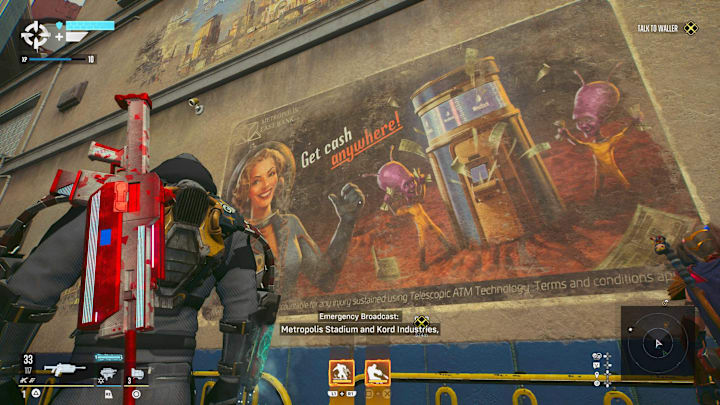Warner Bros. Games' recent admission regarding the underperformance of its live-service shooter, Suicide Squad: Kill the Justice League, has sent ripples through the gaming industry.
Released less than a month ago, Suicide Squad: Kill the Justice League failed to meet the publisher's expectations, with Steam player numbers barely reaching 1,000. During a February 23 earnings call, Warner Bros. Discovery chief financial officer Gunnar Wiedenfels openly discussed the disappointment surrounding Rocksteady's latest action-adventure game. While specific sales figures were not disclosed, Wiedenfels acknowledged that Suicide Squad did not achieve the success the company had hoped for, especially when compared to Hogwarts Legacy's notable achievements.
The studio behind the game, Rocksteady, is renowned for its acclaimed Arkham series, which has left a lasting impact on the gaming industry. However, Suicide Squad diverges from the formula of the Arkham games, resembling more of a live-service title akin to WB Games Montréal's Gotham Knights. Critics have described Suicide Squad as lacking the depth and immersion of its predecessors, instead focusing on repetitive challenges and events.
The game falls into the category of titles that reside between greatness and mediocrity, leaving players and developers hoping for more.
Despite its rocky start, Warner Bros. remains optimistic about the game's future. Plans for endgame content and new playable characters, such as Joker and potentially Mr. Freeze, offer potential for improvement. The industry is no stranger to games evolving post-launch, and there's still a chance for Suicide Squad to meet the publisher's benchmarks and player expectations.
Warner Bros. Games has yet to respond to requests for comment, leaving fans and industry observers eager to see how Suicide Squad will evolve in the coming months. Whether it can turn the tide and achieve the success Warner Bros. envisioned remains to be seen, but for now, the game's fate hangs in the balance.
The disappointing reception of Suicide Squad: Kill the Justice League raises important considerations for the gaming industry. It highlights the challenges developers face when departing from successful formulas and venturing into new genres or gameplay styles.
Rocksteady's transition from the acclaimed Arkham series to a live-service format illustrates the risks involved in trying to capture a different audience or capitalize on ongoing trends. While live-service games can offer longevity and community engagement, they also require a delicate balance of content updates, player retention strategies, and satisfying gameplay mechanics.
The lukewarm response to Suicide Squad also sheds light on the expectations set by previous successes. Fans of the Arkham series may have had high hopes for Rocksteady's next venture, leading to heightened scrutiny and comparison. This phenomenon is not unique to Suicide Squad; many sequels or spiritual successors face similar challenges when following beloved titles.
Furthermore, the evolving landscape of the gaming industry, with its emphasis on live-service models and ongoing content updates, adds pressure on developers to deliver compelling and engaging experiences from launch day. A game's success is no longer solely determined by initial sales figures but by its ability to retain and engage players over time.
Warner Bros.' acknowledgment of Suicide Squad's shortcomings also highlights the transparency increasingly expected from game publishers. Openly discussing a game's performance, even when it falls short, demonstrates a commitment to accountability and a willingness to learn from mistakes.
As the gaming industry continues to evolve, the fate of Suicide Squad: Kill the Justice League serves as a cautionary tale and a learning opportunity. It prompts developers to carefully consider their approach to new projects, ensuring a balance between innovation and meeting player expectations. For players, it underscores the importance of managing expectations and approaching new releases with a critical yet open-minded perspective.
In the end, the story of Suicide Squad's reception is not just about one game; it reflects broader trends and challenges within the gaming landscape. It reminds us that success in this dynamic industry requires a delicate balance of creativity, player engagement, and a willingness to adapt to changing market demands. Whether Suicide Squad can overcome its initial stumbles remains to be seen, but its journey serves as a valuable case study for the games industry as a whole.
Looking ahead, the response to Suicide Squad: Kill the Justice League prompts reflection on the future of live-service games and the importance of player feedback. Developers and publishers must consider how to strike a balance between providing ongoing content and ensuring that each update enhances the overall gaming experience.
For players, the discussion around Suicide Squad serves as a reminder of the power they hold in shaping the industry. Their feedback and engagement can influence the direction of future games and encourage developers to strive for excellence.
In the wake of Suicide Squad's underperformance, the gaming community eagerly awaits Warner Bros.' next moves. Will the promised endgame content and new playable characters revitalize interest in the game? Can Suicide Squad evolve into a title that meets both player expectations and the publisher's benchmarks?
Ultimately, the fate of Suicide Squad: Kill the Justice League is a story of redemption and resilience. It showcases the industry's capacity for growth and adaptation, even in the face of initial setbacks. As the gaming landscape continues to evolve, with new consoles, technologies, and player preferences emerging, the journey of Suicide Squad remains a compelling narrative to watch unfold.
Whether Suicide Squad ultimately rises to meet its potential or serves as a cautionary tale, its impact on the games industry is undeniable. It prompts discussions about game development, player engagement, and the ever-evolving nature of video games as a form of entertainment.
As players and developers alike navigate the complexities of the gaming world, the lessons learned from Suicide Squad: Kill the Justice League will continue to resonate. It's a reminder that in this dynamic and rapidly evolving industry, success is never guaranteed, but the journey to achieve it is always worth exploring.
